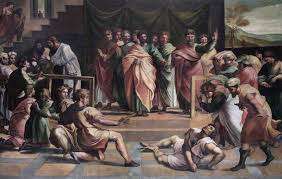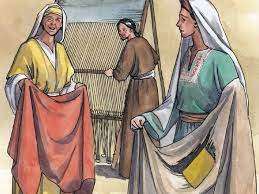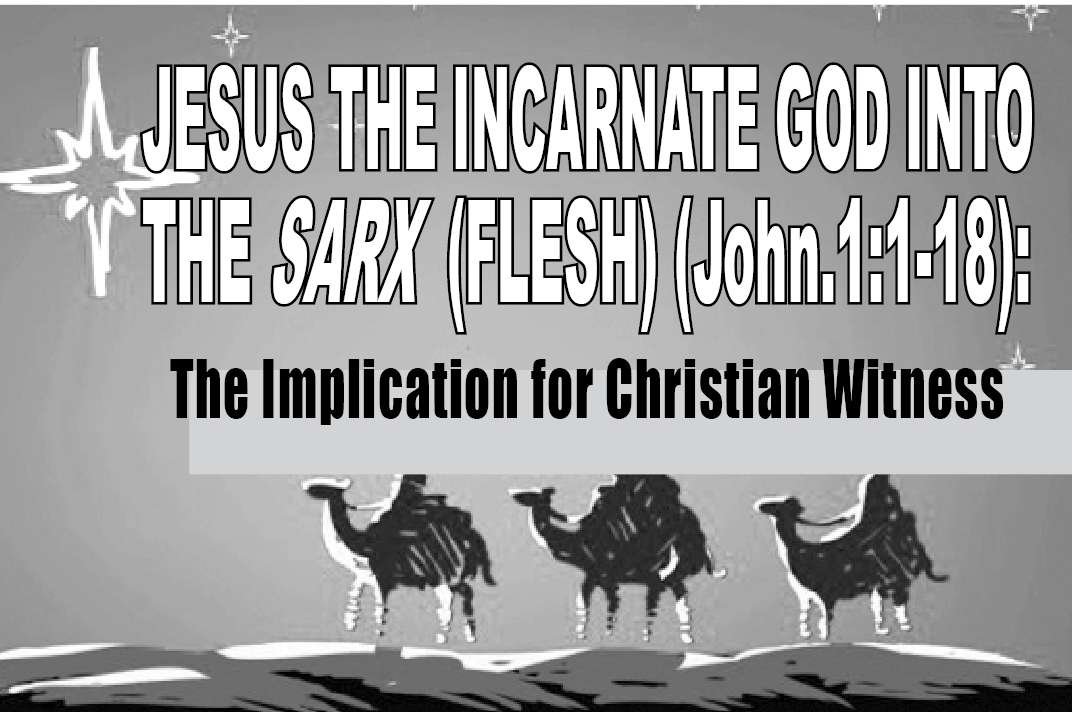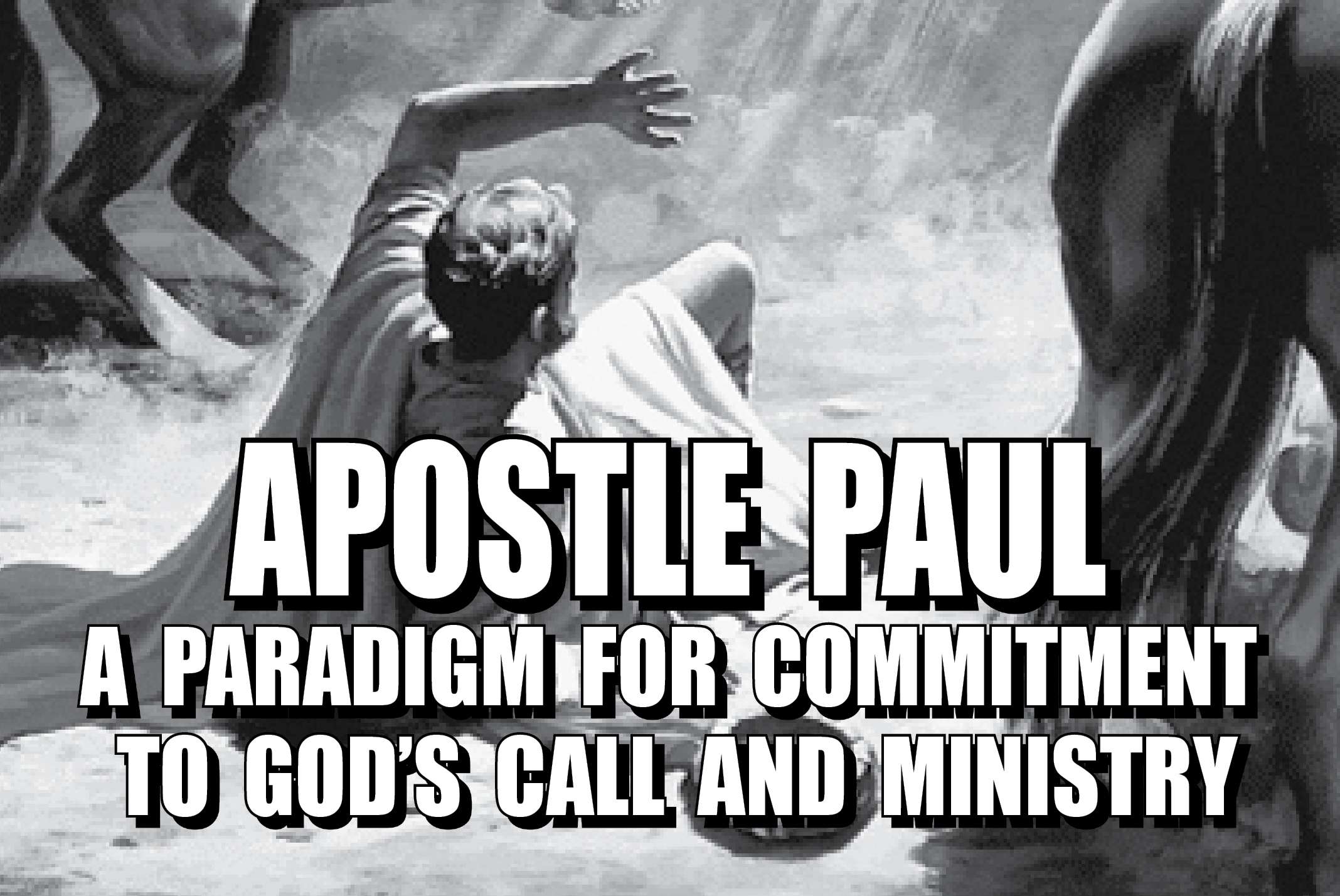

Conversion or Conviction? A Biblical Perspective
Dr. Jose L.
India is a land of many religious traditions and it is very much pluralistic. The word conversion is very significant in the context of its pluralistic cultural heritage of diverse socio-religio-ethnic identities. The Hindu nationalists accused the Christian missionaries for converting Adivasis, Dalits and Tribals to Christianity and they state that religious conversion leads into conflicts. However, religious conversion is a ‘multidimensional, multilocational, multirelational’ phenomena.
The issue of religious conversion and re-conversion became increasingly controversial in India since the end of 20th century through the resurgence of Sangh Parivar. They appropriated conversion as a political tool against the minority Christians to intimidate them from preaching the gospel of Jesus Christ. This has caused serious debates among the intelligentsia: some arguing for conversion and others vehemently opposing it, taking either the constitutional rights or the coercive elements in support of their position. Amidst such ambiguities, it is important to consider the following questions. What is the etymological implication of conversion? What does the Bible speak about conversion? Is conversion Biblical or conviction followed by conversion what happened to Biblical characters?
Etymology of the word Conversion:
The word conversion is not frequent in the Bible. The Hebrew word ‘Sub’ (to turn round) and the Greek word ‘epistrephein’/‘epistrepho’ (to turn towards God) are the two words used in the Bible in connection with the idea of conversion. It does mean a radical change in a person’s life and thought or the idea of turning towards, turn round, return and turning to the living God. A closely related Greek word for ‘epistrphein’ is Metanoeo, which means a change of mind or remorse (Amos.4:6; Hos.5:4; 6:1; J.Goetzmann, “Metanoia,”Dictionary of NT Theology, pp.357-59).
In the Biblical narrations, revelatory events are used in conversion/ transformation experiences. There are narrations like Ruth in the OT and Cornelius in the NT (Acts), which are used to display crossing from one religious tradition to another. However, there is a huge debate over Paul’s “Damascus road experience,” (conversion or call?), and the consequential transition from Judaism to Christianity.
CONVERSION IN THE OLD TESTAMENT
The Bible from the start to end is a missionary book which speaks of a God who longs to reconcile the fallen and rebellious humanity to him and to establish his reign on the earth. In this process, God called Abraham and subsequently made a covenant with the people of Israel in view of salvation to humanity so that the nations will turn towards God (Gen.24:4; 28:14; Isa.42:6, 7; 49:3, 6). Through the prophets, God calls both the people of Israel and the nations/ Gentiles to ‘turn from evil ways and practices’ to the living God (Mal.3:7; Hos.5:4; 2Kings.23:25; Jon.3:10; Zech.1:4).
Prophet Isaiah and Jeremiah called Israel to return to God (Isa.5:5; Jer.3:1-4:4). There are blessings of forgiveness (Isa.55:7), fertility and prosperity and life (Hos.14:5ff; Ezek.33:14) for those who heed to the call and judgement of captivity and destruction to those who refuse to heed the call to turn towards God (Hos.11:5; 1King.9:6-9) (F.Laubach, “Conversion,” p.354). Jeremiah and Ezekiel are promising for a new heart and Spirit to the people as a whole in this process of turning (Jer.33:31ff; Ezek.11:19; 18:31; 36:26f).
THE STORY OF RUTH: A NARRATIVE OF CONVERSION
The same word ‘Sub’ ‘turn’, ‘return’ ‘go back’ or ‘turn back’ is used in the book of Ruth for her decision in following the God Israel (1:6, 7, 8, 10, 11, 12. 15a, b, 16, 21, 22a, b). The story of Ruth is a narration of “conversion” with conviction of a living God, transcending the limits of national, cultural, socio-ethnic and religious interest. Her story shows that how a Gentile Moabite woman became part of the Davidic ancestry (Ruth.4:17-21) and how she came into the genealogy of Christ (Matt.1:1,5). She was an outsider (Ruth.2:2, 6, 22) who chose to align herself with Israel and their God.
Moab in this story is a place of death and destruction and would carry negative moral and emotional connotations (Numb. 22,25; cf.Deut.23:3 ). She says with strong conviction that “your God will be my God, she swears an oath by the God of Israel” (Ruth.1:6, 17). Her words and actions show this radical turning which is governed by loyalty and love towards the God of Israel. The book ends with a genealogy of David which is traced through David’s line and the conversion of Ruth explodes the myth of Jewish racial purity. Further, the story becomes a story of redemption for Israel and it is based on grace and God’s faithfulness. (Farmer, “The Book of Ruth”, NIBC, pp.261-306.]
CONVERSION IN THE NEW TESTAMENT
In the NT, the word epistrepho is used in line with ‘turning towards God’ (Lk.4:14; Lk.22:32; Ac.15:Ac.15:19; 2Cor.3:16; Jas.5:19, 20) from their evil ways in the context of the nearness of the Kingdom of God (Mt.3:2). The word meaning leads to repentance from one’s old ways and start bearing the fruit of repentance (Matt.3:2,8). Moreover, this is a call to the society or to the nations (cf.Ac.13:24; 19:4) to turn towards God’s righteousness.
Jesus calls the people for repentance just like John the Baptist (Matt.3:2; 4:17). He taught through parables about returning back to God with a renewed understanding of God (Lk.15:11-32; Mt.20:1-16). It is God who takes the initiative through Jesus for a call to return to God. This turning naturally resulting into joy because of the new life the person is going to experience (e.g.parables of the lost coin, sheep and son Lk.15). (Goetzmann, “Metanoia,” p.357). This turning towards God is reflected naturally through the conversion experiences both inwardly and outwardly.
JOHN
John uses the imagery of the new birth/ new life to this process of turning towards God (e.g. Nicodemus). In the faith journey of a Christian, the change is very important because the person is born again in the Spirit. He dies to the old self and being born into the new life (Jn.3:3). John is presenting a life from above and it is a new relationship with Jesus (Jn.15:1-7; 18-19; cf.1Pet.1:3-5, 14, 23; 2:2). This new birth is called for an ethical and social behaviour (Jn.17:20-26) which is called for a mission practice of love and unity. This united community of Christ evangelise others by sharing the semeia of Jesus Messiah, Son of God (Samuel, “Mission Practice: The Early Christian Perspective”, DTJ 4.1 (2007), p.20)
CONVERSION IN THE EARLY CHURCH
The early church’s preaching also continues to be in line with the call to repentance and faith (Ac.20:21; cf.19:4; 26:28), turning from evil to God (Ac.8:22; 20:21; 26:20; cf.2Cor.12:21; Rev.2:21f). (Goetzmann, “Metanoia,” p.358.)
In the Acts of the Apostles, when the gospel spreads to the Greco-Roman world the turning is taking place in so many lives and there is a ‘conversion’/ call/transformation/ a conscious turning from sin (Ac.3:19; 11:21; 26:18).
The mission practice of the early Christians crossed boarders of Palestine and entered into the Greco-Roman world of the Gentiles where their outlook was beyond the boundaries of Jewish exclusivism and legalism. (Barton, Paul as Missionary and Pastor,” 35.)
“Paul’s missionary and pastoral work offers a priestly role in the eschatological scheme of bringing together people of all nations to glorify God irrespective of any cultural, ethnic, cultic barriers and boundaries” (Samuel, “Mission Practice,” 15). In this process Paul was an advocate of universalism and opposing cultural specification of circumcision and food laws on Gentile believers (Gal.2:4-5). (Samuel, “Mission Practice,” p.17).
ACTS AS A NARRATIVE OF CONVICTION AND CONVERSION
Stories of turning towards God are narrated by Luke through the conviction and conversion of Cornelius (Ac.10:1-11:18) and Paul (Ac.9,22,26) and even others (Ac.2:41-42; 4:4; 9:35, 42). Luke narrates the mission of the apostles in the Gentile Greco-Roman world and the formation of the Christian Community. In the mission process repentance and asking forgiveness to the old life is very much part of the ‘turning point’ as he/she enters into the Christian faith (Ac.3:19; 26:18). Repentance and forgiveness are for both Jews and Gentiles and it goes hand in hand in Acts. In this process Peter invited people to repent (Ac.2:38; 3:10). After they were convicted of sins. He preached in Cornelius’ house to obtain forgiveness of sins (Ac.10:43). Paul also preached repentance at Athens (17:30). Luke, more than any other evangelist, narrates the role of preaching in order to turn towards God which is called conversion (Ac.3:19; 9:35; 11:21; 14:15; 15:19; 26:18, 20; 28:27).
Paul’s Call/Conviction/Conversion/Transformation (Ac.9:1-30; 22:3-21; 26:2-23; Gal.1:11-17; Phil.3:4-17)
Traditionally Paul’s Damascus encounter was interpreted as a Christian conversion because he had a guilt conscious for his failure to keep the law and the change happened to him when he came to know the glorified Christ. However, recent Pauline studies (K.Stendahl onwards) have proven that it is a call rather than a conversion from one religion to another. The old reading is based on the Western understanding of the introspective reading of Augustine and Luther. According to Stendahl, Paul did not have conversion from Judaism nor did he suffer from an inner experience of guilt or despair. He was called to be an apostle to the Gentiles. It is an act ‘with full conviction’ (Rom.14:5), and ‘for all that is not out of conviction is sin’ (Rom.14:23). (Stendahl, Paul among Jews and Gentiles, 7-23).]
Paul continues to be a Jew as he obeyed the call to preach the gospel to the Gentiles/ Nations (Gal.1:15-16; 1Cor.9:1-2; 15:8-10). The Damascus event made him more a missionary and being “an apostle of the one God who is creator of both Jews and Gentiles” (cf.Rom.3:30; Stendahl, Paul among Jews and Gentiles, 12,15).
The Paradigm shift in Paul’s Life
There is a turning from an ethnic God of Israel to a universalistic concept of God; turning from law/legalism to grace and turning from legalism to new life in Jesus/ ethical life (the paidagogos/ tutor to promise fulfils on faith in Jesus the Messiah) (Stendahl, Paul among Jews and Gentiles,19-20).
The object of the revelation of Jesus Christ convicts Paul to preach the gospel among the Gentiles (Gal.1:16). His gospel to the Gentiles is rooted in his conviction of the divine revelation and divine calling.
Stendahl clears the doubt of the change of name in Acts from Saul to Paul. It is a transliteration of the Hebrew name Saoul (before Ac.13:9 Saul and after this Paulos in the context of encountering the Roman officials). The Lord and Ananias use the Hebrew name Saoul (Ac.9:4, 17; 22:7, 13; 26:14) otherwise there is no change of the name (Paul among Jews and Gentilesp.11).
CONVICTION AND CONVERSION OF CORNELIUS (Ac.10:1-48)
Cornelius and his household’s episode show the expansion of the gospel to the Gentile world and this event inaugurated Gentile mission in the early church. Cornelius is the first Gentile convert in the story world of Acts in the sense of moving from a purely Gentile context to a Christian faith. The repetitions of events (Ac.10, 11, 15) explain the significance of his conversion in the scheme of Christian mission. The whole family of Cornelius became part of the first century eschatological community.
The impartial nature of God is expounded through Peter’s speech at Cornelius house (Ac.10:34, 35). God who takes the initiative and human interactions are proportionately working out for this great change. In this episode, God’s plan for the Gentile mission is set forth in visions that transformed the attitude of both Peter and Cornelius (Ac.10:1-23). Peter the spokesperson of the infant church becomes the converted leader to initiate the Gentile mission officially (Ac.10:2, 22, 30; 11:12-14; 15:7-11).
God instructs Peter through the vision of clean and unclean food to teach (Ac.10:12-13) not to show any discrimination towards the Gentiles. God convicted Peter about the purity-pollution concepts before he convicted Cornelius (cf.Mk.7:14-23).
By giving hospitality to one another, having fellowship with the Gentile soldiers from Cornelius side, God is convicting the universal acceptance of all humanity (Ac.10:17-23). Sending the gift of the Holy Spirit upon the Gentile Cornelius family (Ac.10:44-48) and hearing them speaking in tongues (vv.44,45), the Jewish spectators convicted God’s acceptance of the Gentiles equal with the Jews (Ac.11.1,18;13:48; 14:27; 15:7,12). This event finally becomes the parameter in deciding in the Jerusalem council (Ac.15:12-29) the Law free Gentile mission and the Gentiles became part of the messianic community without circumcision.
The Cornelius episode became a paradigm shift to leave their narrow-minded cultural nationalism and embrace a universal outlook. The similar encounter with Christ provides conviction and transformation in the life of the people even today in anywhere in the world.
CONVICTION AND CONVERSION: A PARADIGM FOR CHRISTIAN MISSION
1. Conviction and Conversion
Conversion is not transferring from one religion to another but it must be something to happen to everyone every day whether one is a Jew or a Gentile. The divine encounter with Christ gives conviction and conversion resulting a turning towards God and transformation. This conversion happens to all who encounter the glorified Christ both the Jews like Paul and Peter and Gentiles like Ruth and Cornelius.
In a pluralistic context, like that of India, conversion has always been understood primarily with political overtones because of the unholy nexus between religion and politics. The call/ conviction/ conversion/turning towards God must be understood primarily from a spiritual dimension and the freedom of an individual guaranteed to every citizen by the constitution of India. However, the oppressive social hierarchy of Hinduism structured according to the principal of purity and pollution, institutionalised through the caste system, conversion is probably an attempt to break free from the religious oppression and exploitation.
2. Encountering the transforming grace of Christ
The divine encounter convicts and transforms people’s lives similar to the life experience of Ruth, Apostle Peter, Cornelius and Apostle Paul. “Paul himself saw the transformation of his life as the most important part of his experience and understood being an example of the transforming grace of Christ as an integral part of his apostolic role.” (J.M.Everts, Conversion and Call of Paul”, DPL,160). The transforming grace moved him from the religio-political center to the space of the marginalised Gentiles.
Paul believed that God’s blessing through Abraham to all nations has come through the gospel of Christ Jesus. Further Paul understood his missionary role of bringing together people of all nations to glorify God irrespective of any cultural, ethnic, cultic barriers and boundaries. Paul’s ideology was changed from an exclusive understanding to an inclusive understanding of God (God of all); Jewish exclusivism and legalism to the universal outlook beyond the boundaries. Similar convictions and conversions happen in any lives once they encounter the glorious Christ.








